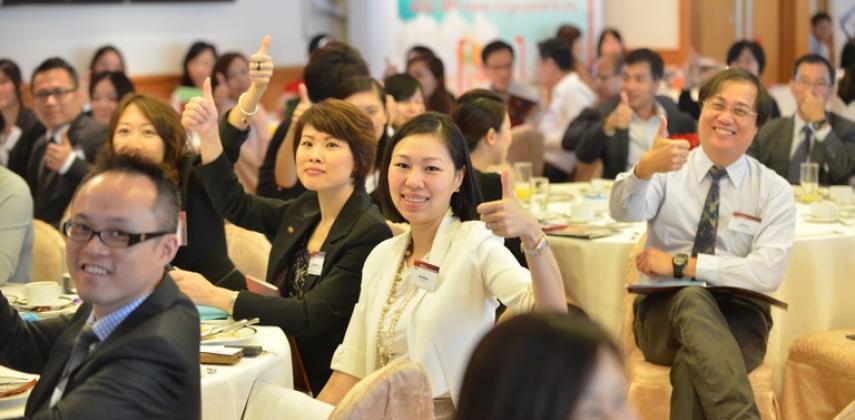They don’t care how much you know, until and unless they know how much you care. That applies to all generations of employees.” This was the parting advice given by one of the human resources (HR) experts at the Generational Challenge Seminar, organised by the Classified Post, at Happy Valley Racecourse.
More than 150 HR directors and professionals attended the networking seminar. They listened to four industry experts discuss critical HR issues and how to recruit, retain, engage and synergise talented employees from different generations.
In his opening remarks, Stanley Suen, director of recruitment services, South China Morning Post Publishers, cited age differences in the workforce as one of the biggest challenges facing today’s organisations.
“Do you have a tough time communicating with co-workers who are much younger or older than you? As we all seem to have different generations, one-size-fits-all does not work any more. We have to work extra hard to provide different products and services so that we can target different generations of jobseekers more effectively,” Suen said.
“Gen Y is the most digitally sophisticated generation. They are clocked in 24/7 to their mobile phones, laptops and other gadgets. They are confident, ambitious, and achievement-oriented as they rely on technologies to perform their job better. And they are the fastest-growing segment of our workforce today,” he stressed.
Guest speakers at the networking seminar were Virginia Choi, managing consultant and country manager at Tamty McGill Consultants International; Morris Cheung, human resources director-designate at MTR Corporation; Barry Ip, head of human capital development at Hong Kong Jockey Club; and Professor Randy Chiu, director of the Centre for HR Strategy and Development at Hong Kong Baptist University.
During the panel discussion, participants questioned the speakers and shared their own ideas about the generational challenge.
Sou Chiam, CEO of the Financial Dispute Resolution Centre (FDRC) and a former member of the New Zealand Human Rights Commission, lauded efforts to fight age discrimination in the workplace. “In New Zealand, if you discriminate based on age, you’re in trouble because it’s a [criminal] offence. It’s a loss for Hong Kong’s productivity if you’re not going to use the experience and talent of older workers,” she said.
“It is about time that we rethought how we treat our older workers. All these misconceptions and perceptions that they can’t learn new technology, that they are forgetful, that doesn’t bear up in actual practice,” Chiam added.
Heidi Ma, a young intern at Tamty McGill, expressed concerns about fewer promotion opportunities for her generation and a widening generation gap with employers due to Hong Kong’s ageing population and delayed retirement age.
In reply, Chiu assured her that in Hong Kong’s open economy, all kinds of talents would always be needed. “If you are talking about careers that depend on performance, I think it will be fair to say that anyone who would excel can move up. Everybody is on an equal footing. In any rank of professionals, if they continue to work effectively and be able to learn new things, their career mobility will not be slowed down,” he stressed.
Jovy Wong, associate director at Ernst & Young, talked about ample career opportunities for the younger generation.
“Actually there are so many opportunities. I see people climbing the career ladder much faster than before. Many executive positions are actually taken by very young, talented people. So the opportunities are there. It’s just whether you can demonstrate all those good, positive attributes and contribute to the company. So you have to be more mature. You need to take ownership. You get all those attributes and you’ll get the position,” Wong said.
Guangzhou-based Liza Cheung, HR director at Amway HK and president of the Human Resources Institute in China, described her company’s urgent requirement for talented people.
“At Amway in China, every year we have over 1,000 openings including replacements. Each year, 30 per cent of them are promoted from within. And we have 8,600 employees. Every year, we would recruit 30 to 40 [graduates] from campuses,” Cheung said.
“If you have talent, we will think of a way to attract you, how to retain you, and develop you. Because all companies that want to grow need to have talented employees. This is one of the important keys to growing a business – with good people, with talented employees,” Cheung added.
Being in manufacturing, Irene Tang, regional HR director for Asia at Pulse Electronics, has had a lot of experience working with the younger generation.
“When you have a chance to work with younger talents, you will find out that they are very eager to learn and they like to have exposure. What we need to do as employers to support them is to create some career paths and make them very attached to management,” Tang said.
“In the past two years, we have launched a training programme on how managers and supervisors can work with the younger generation aged 18 to 30. We will also launch a programme on how the younger generation can work with those above 30 and baby boomers. We hope that there can be more networking events like this,” Tang added.


